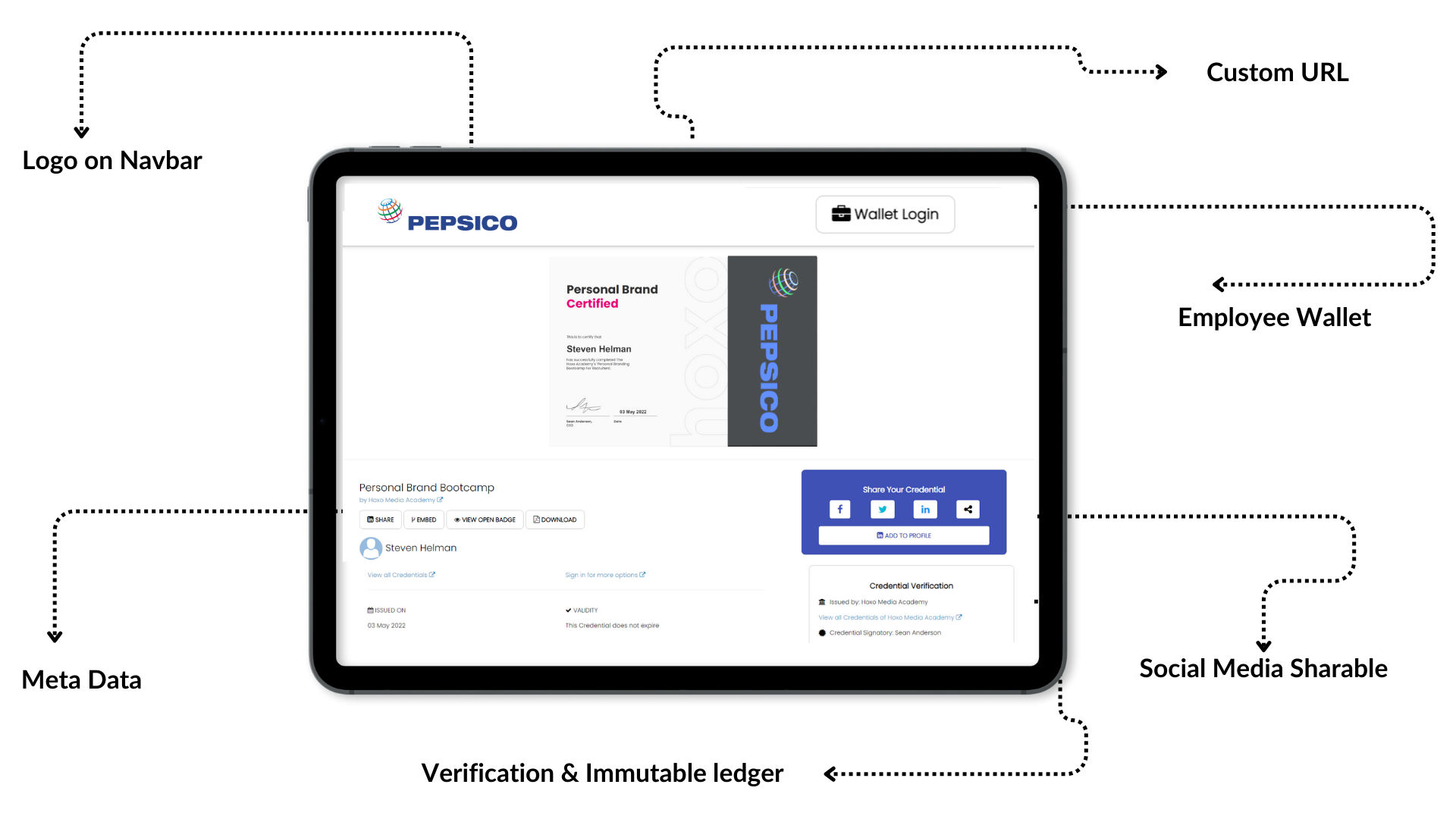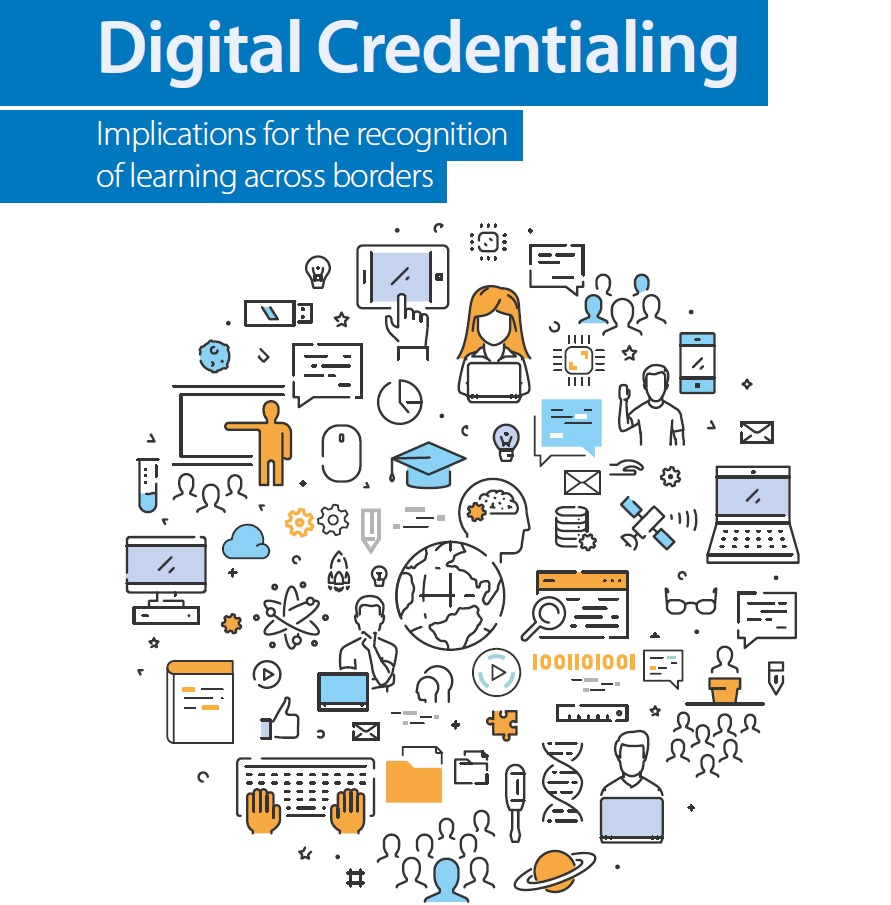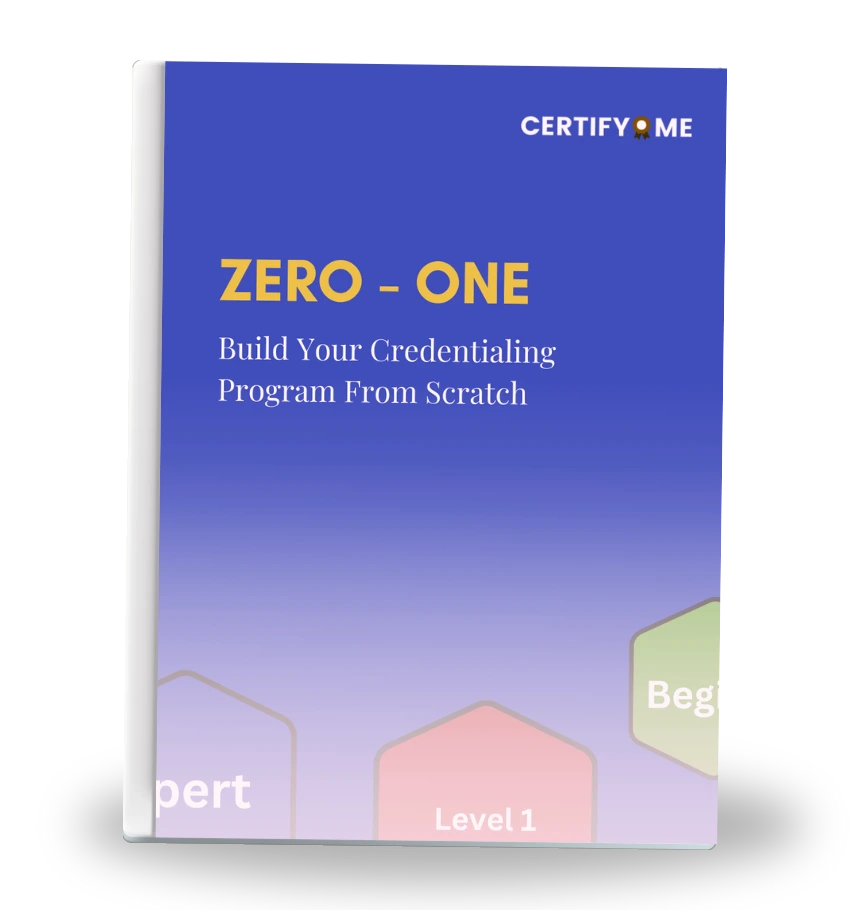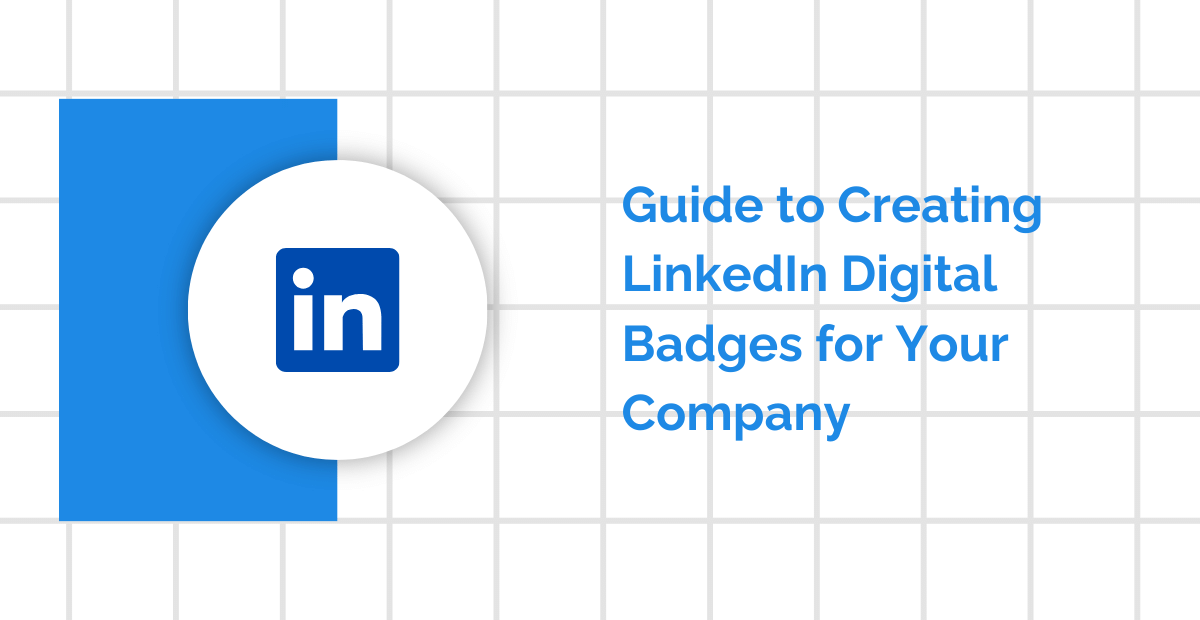Hey there! Ever wondered how digital credentials are changing the game in 2025? Digital credentials are quickly becoming the new standard for verifying and showcasing achievements, whether it’s for a certification, course completion, or professional milestones.
In this blog, I’ll walk you through exactly what digital credentials are and why they’re so important right now. We’ll explore how they stack up against traditional methods and why they’re crucial for both issuers and recipients. Trust me, understanding these changes is key to navigating our increasingly digital world effectively.
So, grab a coffee and get comfortable. By the end, you’ll see why digital credentials are more than just a buzzword—they’re a vital part of the future of credentialing. Let’s get into it!
What Are Digital Credentials?
Let’s break it down. Imagine it as a high-tech version of a certificate or badge that proves your skills, achievements, or qualifications. Instead of holding onto physical documents or PDFs, you get a digital version that’s stored online. It’s like having a digital badge that can easily be shared and verified with just a few clicks.
A few years back, proving your credentials meant dealing with stacks of paper or PDFs. Fast forward to today, and digital credentials have taken over. They’re not just a fad; they’re becoming the norm. This shift means no more paper clutter—just instant access and easy verification of your achievements.
So, why should you care? Digital credentials streamline the process of showcasing your achievements—whether it’s completing language training, mastering a technical skill, or earning a professional certification—and make it simpler for employers or educational institutions to verify them. Stick with me, and I’ll explain more about how they’re used and why they’re so important in today’s world.
Further Reading : What is the difference between a Certificate and a Digital Credential?
Types of Digital Credentials
Alright, let’s dive into the different types of digital credentials. Each one has its own unique features and uses, and understanding these can help you make sense of how they’re used today.
Digital Certificates
Think of digital certificates as your formal achievements in digital form. They’re like your traditional diplomas or certificates but online. They provide a detailed record of what you’ve accomplished and are great for proving formal qualifications or skills.
Digital Badges
Digital badges are like your personal trophies. They’re visually appealing and represent a specific skill or accomplishment. Badges are usually earned through completing certain tasks or challenges, making them perfect for showcasing smaller milestones.
Even though, it might see the same, there are considerable differences when you compare a digital certificate vs digital badge.
Micro-Credentials
Micro-credentials are all about those specific skills or achievements that don’t require a full-blown degree or certification. They’re bite-sized credentials that focus on particular skills, like mastering a software tool or completing a short course. They’re great for showing off specialized abilities.
Stacked Credentials
Stacked credentials are like building blocks for your career. You start with smaller, individual credentials and combine them to showcase a broader range of skills. Think of it as stacking different badges or certificates to create a comprehensive profile of your expertise.
Blockchain Credentials
Blockchain credentials are the cutting-edge of digital verification. They use blockchain technology to create secure, tamper-proof records of your achievements. This means your credentials are not only digital but also incredibly secure and verifiable, ensuring authenticity.
Each type of credential offers a unique way to highlight your achievements. Understanding these options helps you choose the best way to showcase your skills and accomplishments effectively.
What Are The Differences Between Digital Credentials, Paper Credentials, and PDF Credentials?
When it comes to proving your achievements, you have a few options: paper credentials, PDF credentials, and digital credentials. Paper credentials are your traditional certificates or diplomas that come on physical paper. They’re tangible and have been used for decades, but they can be cumbersome to manage and verify. PDF credentials are a step up, offering a digital format that can be easily shared via email. However, they’re still static and can be altered, making them less secure.
Now, digital credentials take things to a whole new level. Unlike their paper and PDF counterparts, digital credentials are interactive and secure. They are stored online, easily accessible, and can be verified instantly. They offer enhanced security features and are resistant to tampering. Digital credentials also integrate seamlessly with other systems, making them a superior choice for both issuers and recipients.
Here’s a quick comparison to show how digital credentials stand out:
| Factor | Paper Credentials | PDF Credentials | Digital Credentials |
|---|---|---|---|
| Format | Physical paper | Digital document | Online, interactive |
| Ease of Sharing | Requires mailing or hand delivery | Easy to share via email | Instant sharing online |
| Verification | Manual, time-consuming | Requires additional verification tools | Instant, automated |
| Security | Susceptible to loss or damage | Can be altered | Secure, tamper-proof |
| Accessibility | Requires physical handling | Accessible on any device | Accessible anytime, anywhere |
| Update Capability | Static, requires re-issuance | Static, requires new file | Easily updated and managed |
| Cost | Printing and mailing costs | Minimal, digital storage | Generally lower long-term costs |
| Integration | No integration with other systems | Limited integration | Seamless integration with digital systems |
| Environmental Impact | Paper waste | Digital but still reliant on print-outs | Minimal, eco-friendly |
In summary, while paper and PDF credentials have their uses, digital credentials offer a modern, secure, and efficient alternative that addresses many of the limitations of traditional methods. They’re designed to fit seamlessly into today’s digital world, making them the superior choice for managing and showcasing achievements.
What Are The Differences Between a Digital Badge and a Digital Certificate?
When navigating the world of digital credentials, you’ll often come across digital badges and digital certificates. Both serve as proof of achievements but differ in their purpose and presentation.
A digital certificate is a formal document that verifies a specific qualification or accomplishment, similar to a traditional diploma. It provides detailed information about the achievement and is often used to prove significant milestones, like completing a degree or certification program.
On the other hand, a digital badge is more like a visual representation of smaller, specific accomplishments. Badges are often used to signify incremental achievements and are visually appealing, making them easy to display on social media or professional networks. If you’re interested in a deeper dive into digital badges,
click here to learn more about their unique features.
Here’s a comparison table to help you understand the key differences:
| Factor | Digital Badge | Digital Certificate |
|---|---|---|
| Purpose | Represents a specific skill or achievement | Verifies a formal qualification or significant accomplishment |
| Detail Level | Provides a summary of the achievement | Contains detailed information about the qualification |
| Visual Appeal | Often includes a graphic or icon | Typically a formal document, less visually prominent |
| Use Cases | Ideal for showcasing small milestones or skills | Used for significant achievements like degrees or certifications |
| Display | Easily shared on social media and professional networks | More formal, often used in official documentation |
| Verification | Usually includes metadata for verification | Includes secure, verifiable data about the credential |
| Flexibility | Can be easily earned and displayed | Generally awarded upon completion of a formal program |
| Integration | Integrates with online profiles and networks | Often integrated with institutional records or formal databases |
What is an Example of a Digital Credential?

Let’s break down what makes up a digital credential and how it functions:
- Custom URL: Each digital credential includes a unique, custom URL. This link directs anyone who clicks on it to the credential’s detailed information, making it easy to access and share.
- Navigation Bar: The credential features a navigation bar that lets users quickly move between different sections, such as the credential’s details, issuer information, and related achievements.
- Employee Wallet: Digital credentials are often stored in a digital wallet. This secure, centralized location keeps all your credentials organized and easily accessible.
- Metadata: Rich metadata accompanies each credential, including details like the issuer, issuance date, and criteria met. This information helps validate and explain the significance of the credential.
- Verification and Immutable Ledger: Digital credentials are verified using secure tools to ensure authenticity. Many are recorded on an immutable ledger, such as blockchain, which ensures that the credential’s details remain unchanged and trustworthy.
- Shareable Function: With built-in sharing options, digital credentials can be easily shared on social media, professional networks, or via email, making it simple to showcase your achievements.
Curious to see these components in action? Click here to view and experience different kinds of sample digital credentials.
How to Verify Digital Credentials Instantly
Verifying digital credentials has never been easier. With the right tools and processes, both organizations and individuals can quickly confirm the authenticity of digital credentials. Let’s break down how this works for each group.
Digital Verification for Organizations
For organizations, instant digital credential verification is crucial for maintaining security and efficiency. Here’s how it typically works:
- Automated Systems: Many organizations use automated systems that connect with credentialing platforms. This allows them to instantly check the validity of a credential without manual intervention.
- Integration with Databases: These systems integrate with databases to cross-check the information. This ensures that the credential matches records from the issuing body.
- Verification Tools: Special verification tools can scan the credential for embedded data and metadata, ensuring that it is authentic and unaltered.
Example: An HR department receiving a job application might use an automated system to verify a candidate’s digital certification, instantly confirming its validity against the issuer’s database.
Digital Credential Verification for Individuals
For individuals, verifying digital credentials is straightforward and user-friendly:
- Direct Access: Individuals can often verify credentials directly via a unique URL provided with the credential. This URL links to a verification page with details about the credential’s authenticity.
- Verification Platforms: Many digital credential platforms offer built-in verification features. Users can enter their credential information into these platforms to confirm its validity.
- Blockchain Verification: For credentials stored on blockchain, users can verify their authenticity by checking the credential’s record on the blockchain ledger.
Example: A job seeker might use a provided URL to verify a digital badge or certificate on the credentialing platform’s website, ensuring potential employers that the credential is legitimate.
The Benefits of Digital Credentials for Issuers
Digital credentials offer several advantages that can significantly enhance how organizations issue and manage qualifications. Here’s a closer look at each benefit:
Verifiable Credentials
Digital credentials come with built-in verification tools that make it simple to confirm their authenticity. This ensures that every credential issued is genuine and trusted by recipients and employers alike. By reducing the chance of fraud or misrepresentation, verifiable credentials enhance the credibility of your organization.
Visibility of Expiration
Unlike static paper certificates, digital credentials can display expiration dates clearly. This feature allows issuers to manage renewals and notify recipients about upcoming expirations. It ensures that all credentials are current and relevant, helping to maintain the integrity of the qualifications you issue.
Fraud Protection
Digital credentials are equipped with security measures that protect against tampering and fraud. Features such as encryption and unique identifiers make it difficult for unauthorized parties to alter or counterfeit credentials, safeguarding your organization’s reputation..
Automation and Integrations
A digital credentialing service can integrate seamlessly with your existing platforms, automating the issuance process and reducing administrative overhead. This means fewer manual tasks, quicker processing times, and a more streamlined workflow for your team.
Updates and Amendments
Easily update or amend credentials without having to reissue them. Whether correcting an error or updating information, digital credentials allow for quick changes that are reflected instantly, ensuring all records are accurate and up-to-date.
Automated Typo Correction
Some digital credential systems include automated typo correction features. This reduces the risk of errors in issued credentials and saves time by correcting mistakes without manual intervention, ensuring accuracy and professionalism.
Retroactive Design Amendments
With digital credentials, you can update the design retroactively. If your organization’s branding changes or you want to modify the look of issued credentials, you can apply these updates to previously issued credentials, ensuring consistency in your branding. Additionally, you can personalize your credentials by adding QR codes, custom signatures, and other widgets for enhanced security and customization.
Issuer Control
Digital credentials give you complete control over the issuance process. You can set permissions, manage designs, and decide who has the authority to issue or validate credentials. This control ensures that your credentialing process aligns with your organization’s standards and policies.
Level of Detail
Digital credentials can include extensive details about the achievement, such as the criteria met, the issuer’s information, and the date of issue. This level of detail provides a comprehensive view of the qualification, making it clear and understandable for recipients and verifiers.
Marketing Reach
Digital credentials can be easily shared across social media and professional networks. This not only helps to showcase the achievements of your recipients but also extends your organization’s reach and visibility, enhancing your brand’s presence in the digital space.
The Benefits of Digital Credentials for Recipients
Digital credentials aren’t just a game-changer for issuers—they offer fantastic benefits for recipients too. Here’s how they make your life easier:
Portability
Imagine having all your credentials accessible from your phone or computer, wherever you go. Digital credentials are stored online, making them easy to access and carry with you. Whether you’re applying for a job or attending a conference, you can show off your achievements anytime, anywhere without juggling physical documents.
Shareability
Sharing your accomplishments has never been simpler. Digital credentials come with built-in sharing features, allowing you to post them on social media or include them in your online professional profiles with just a few clicks. This not only boosts your visibility but also makes it easier for potential employers or collaborators to see your qualifications.
Longevity
Unlike paper certificates that can fade or get damaged, digital credentials remain intact and accessible indefinitely. They don’t deteriorate over time, ensuring that your achievements are preserved and can be verified long after they were awarded. This longevity means your hard-earned qualifications stay valid and valuable for the long haul.
Challenges and Misconceptions of Digital Credentials
While digital credentials offer many benefits, there are some common challenges and misconceptions that can make them seem daunting. Let’s clear up a few of these myths so you can fully appreciate what digital credentials have to offer.
Myth 1: Digital Credentials Offer No Advantage Over Digital PDF Credentials
Some think digital credentials are just advanced PDFs, but they actually offer much more. Unlike static PDFs, digital credentials feature real-time verification, enhanced security with encryption, and tamper-proof technology. They also allow for easy updates and integration with verification systems. While PDFs display information, digital credentials ensure its authenticity and protect it against fraud, making them a far superior option for modern credentialing.
Myth 2: Digital Credentials Are Too Complicated to Manage
Another myth is that digital credentials are complicated to manage. On the contrary, they simplify the process. With user-friendly platforms, you can easily issue, update, and verify credentials. Most systems are designed to be intuitive, reducing the administrative burden and making credential management more straightforward.
Myth 3: Digital Credentials Aren’t Universally Accepted
Some people worry that digital credentials aren’t accepted by all institutions or employers. However, the acceptance of digital credentials is growing rapidly. Many organizations are now recognizing and valuing them for their convenience and reliability. As more entities adopt digital credentialing systems, acceptance will continue to expand.
Myth 4: Digital Credentials Lack Authenticity
There’s a belief that digital credentials don’t hold the same weight as traditional certificates. In truth, digital credentials can be more authentic and verifiable than paper certificates. They include detailed metadata and verification links that prove their legitimacy, making them a reliable source of proof.
Myth 5: Digital Credentials Are Just a Fad
Some might think digital credentials are a passing trend. However, they represent a significant shift towards digital transformation in credentialing. As technology advances and digital integration becomes more widespread, digital credentials are likely to become the standard for verifying qualifications.
Choosing a Digital Credential Platform
When you’re picking a digital credential platform, start by thinking about your needs and what features are most important to you. Some platforms are great for basic credentialing, while others offer advanced features like integration with other systems, customizable designs, or enhanced security. It’s like choosing the right tool for the job—make sure the platform aligns with what you want to achieve.
Next, consider the ease of use and support. You don’t want to be stuck with a platform that’s difficult to navigate or doesn’t offer good customer support. Look for platforms that are user-friendly and have a solid support system in place. A good platform will make it easy to issue, manage, and verify credentials without a steep learning curve.
Finally, think about scalability and future-proofing. You want a platform that can grow with your needs and adapt to future changes. Check if the platform supports various types of credentials, integrates well with other tools, and offers updates or new features regularly. It’s like investing in something that will serve you well in the long run, not just for today.
Make the Change with CertifyMe
If you’re looking for a top-notch digital credential platform, I have to recommend CertifyMe. It’s like that reliable friend who always has your back. CertifyMe ticks all the boxes: it’s user-friendly, packed with features, and offers excellent support. Whether you’re just starting out or need advanced capabilities, it’s got you covered.
One of the standout features of CertifyMe is its versatility. It supports various types of digital credentials, from badges to certificates, and integrates seamlessly with other tools you might be using. Plus, it’s designed to grow with you, adapting to your needs as they evolve. That means you won’t outgrow it anytime soon.
What’s even better? CertifyMe is free to sign up for, so you can dive in and start exploring its features right away. It’s like having a Swiss Army knife for credentialing—versatile, reliable, and ready to handle whatever comes your way. Give it a try and see how it fits into your credentialing needs!
Frequently Asked Questions About Digital Credentials
Where do I find my digital credential?
Finding your digital credential is easy. Typically, it will be sent to you via email or available through an online platform provided by the issuing organization. Check your inbox for an email with a link or access your profile on the issuer’s platform. If you have trouble locating it, contact the issuer’s support team—they’ll help you access your credential.
How can I share my digital credential?
Sharing your digital credential is a breeze. Most platforms offer options to share directly via social media or through shareable links. For CertifyMe users, it’s even easier. Each credential you receive comes with a direct sharing option, allowing you to instantly post it to LinkedIn and over 50 other social media platforms. If you prefer, you can also download your credential as a PDF or image and attach it to emails or include it in your digital portfolio. This flexibility makes it simple to showcase your achievements wherever you need, helping you get the recognition you deserve.
How can I get a hard copy of my digital credential?
If you need a hard copy of your digital credential, check if the issuing platform offers a print option. Some platforms allow you to download a printable version of your credential. Alternatively, you can print the digital credential yourself from your computer or take it to a professional printing service for a polished finish.
How does my digital credential validate my completed coursework?
Digital credentials validate completed coursework by embedding detailed information about the course, such as completion dates, grades, and course content. They often include metadata and verification links that confirm the credential’s authenticity and the issuer’s details. This ensures that anyone viewing the credential can easily verify its validity.
How can my employer use my badge to verify my course completion?
Employers can verify your badge through the verification link or QR code embedded in the credential. By accessing the link or scanning the QR code, they can view detailed information about the course and your achievements. This built-in verification feature ensures that your credential is genuine and provides all the necessary details for validation.
Conclusion
So, there you have it! Digital credentials are reshaping how we validate and showcase achievements, offering far more flexibility and security than traditional methods. Whether you’re issuing them or receiving them, understanding the differences and benefits of digital credentials can make a world of difference in how you manage and share your accomplishments.
As you dive into the world of digital credentials, consider giving CertifyMe a try. With its easy-to-use interface and robust features, plus the added bonus of a free sign-up, it’s a great way to start or enhance your credentialing journey. I genuinely believe it could be just what you need to take your credentialing game to the next level. Give it a go—you’ve got nothing to lose and so much to gain!

 Author :
Author : 




